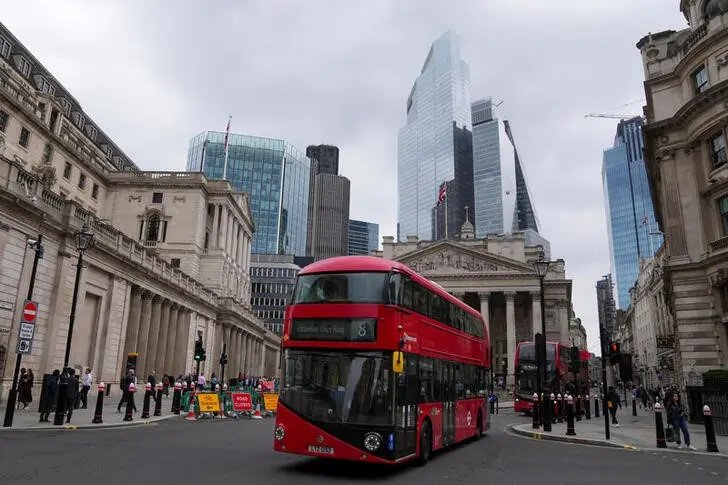Faster UK economy growth gives gift to new government


By Andy Bruce
(Reuters) – Britain’s economy grew more quickly than expected in May, providing some momentum for the new government of Prime Minister Keir Starmer but adding to doubts about whether the Bank of England will cut interest rates next month.
Economic output increased by 0.4% in May, after zero growth in April, the Office for National Statistics said. A Reuters poll of economists had pointed to a 0.2% monthly increase.
The strength of the upturn could dissuade the BoE from beginning to cut interest rates as soon as Aug. 1, its next scheduled monetary policy announcement date. Three policymakers this week emphasised the strength of domestic price pressures.
The chance of a rate cut in three weeks‘ time fell below 50% on the futures markets from just above 50% on Wednesday.
May saw a broad-based increase in economic output, with the services, manufacturing and construction industries all growing and the latter up by 1.9% on the month, driven by house-building.
The figures represented an early boost for the new Labour administration, which has set itself the aim of achieving the fastest growth among the Group of Seven advanced economies on a sustained basis.
The improving economic outlook suggests the government may benefit from the economic recovery being stronger than most forecasters anticipate,” Ashley Webb, an economist with consultancy Capital Economics, said.
Britain’s economy appears to have snapped out of its low-growth rut, at least for now. Output has grown by 1.5% since the turn of the year, marking its best five months since early 2017, excluding the rebound from the COVID-19 pandemic.
Goldman Sachs on Thursday nudged up its growth forecast for 2024 to 1.2% from 1.1%.
Still, the longer-run picture remains weak, with the economy only 2.7% larger than its pre-pandemic level of late 2019.
According to the latest quarterly data, only Germany has fared worse since the pandemic.
Over the three months to May, the economy expanded by 0.9%, the strongest reading since the three months to January 2022, compared with the consensus forecast for a 0.7% expansion.
The BoE said last month it expected the economy would grow by 0.5% over the second quarter – something that now looks likely to prove too low.
“These GDP figures may make an August rate cut less likely by providing those rate setters who are concerned about underlying price pressures with sufficient confidence about the UK’s economic recovery to continue putting off loosening policy,” Suren Thiru, economics director at accountancy body ICAEW, said.
Separate ONS data showed Britain’s overall trade deficit, excluding precious metals, narrowed to 3.2 billion pounds ($4.1 billion) in May from 4.7 billion pounds in April.
But goods exports to the European Union fell to their lowest since January 2022, when Brexit customs checks were introduced, and consistent with levels seen during the late 1990s.
Starmer has said he wants to reduce trade frictions with the EU but he will not agree to joining the bloc’s single market.
($1 = 0.7771 pounds) (This story has been corrected to say that April GDP was flat, not up 0.2%, in paragraph 2)
(Editing by William Schomberg and Hugh Lawson)
Interest rates are the cost of borrowing money or the return on savings, expressed as a percentage of the principal amount. They are set by central banks and influence economic activity.
Economic growth refers to an increase in the production of goods and services in an economy over a period of time, typically measured by GDP growth.
The Bank of England is the central bank of the United Kingdom, responsible for issuing currency, maintaining monetary stability, and overseeing the financial system.
Inflation is the rate at which the general level of prices for goods and services rises, eroding purchasing power. It is typically measured by the Consumer Price Index (CPI).
Explore more articles in the Top Stories category











